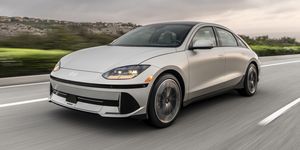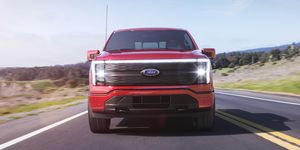The personal car feels foundational to American life, but it only fairly recently became such a fixture in the 20th century. It reformed the industrial and cultural landscapes. In many areas of the country, it altered the landscape itself. Most of us have never known a world without cars. But what has seemed like the natural order of things with cars could change quickly. And it likely wouldn't even have to be at the hands of draconian laws, radical urban planning or the rise of the family e-cargo bike.
Of course, predicting the future is impossible. “Unknown unknowns” abound, sometimes breakthroughs do change everything. But looking at the broader structures, it's easy to see the guard rails keeping the personal car central to American life have eroded. By 2050 owning a private vehicle will probably be akin to owning your own horse: an expensive hobby.
A quarter century is a long time.
Twenty-five years may not seem that long ago in cultural terms (yes, Rivers Cuomo is now in his 50s). But it’s an eternity from a technological perspective. Twenty-five years ago everyone had a landline phone. And Google was some goofy project started by a couple of grad students.
In transportation terms, a little over 25 years is roughly the time it took to transition from horse-dominant living to a world where General Motors was at the helm of a mature car market with modern advertising strategies. The car’s demise may take that long or longer. It could also happen much sooner.
For most people and purposes, cars kind of suck.
Cars do many things for us. But they are blunt tools and supreme overkill for just about every task. Cars are expensive. Accommodating and storing them requires an unfathomable amount of infrastructure and public space. They are environmentally destructive from their construction through their operation and end-of-life cycle.
Transferring your child half of a mile to school via $100,000 Grand Wagoneer is about the least efficient way conceivable to do that. We can do this better, probably with a broader range of specialized solutions.
The internet is undermining the car’s relevance to the next generation.
The car revolutionized getting from one place to another, but the internet is rendering physical location increasingly arbitrary. Cars transformed commuting. But remote and virtual work is ending many commutes altogether. Cars reshaped shopping. But almost all shopping — even groceries and pesky Target errands — can be done online now. If car manufacturers had their way, you wouldn’t even need to travel in a car to a dealership to buy a car.
Cars drove social liberation for much of the 20th century. People could expand their social networks. Concepts like “the teenager” and “dating” didn’t really exist in their modern context before the car. But with the internet, the locus of social interaction and status has moved to phones and social media. You don’t need a car to interact with friends and escape from your parents anymore.
Current transportation infrastructure won’t keep the car alive.
Cities develop according to the transportation technology of the residents. And cities that emerged in the late 20th century grew with the car in mind, often with an endless sprawl of suburbs, shopping centers and eight-lane rodes. The greater Houston area isn’t very walkable. But cities are also living communities that evolve.
If a transportation method develops that’s more affordable and convenient than owning a car, people will use it. And cities will adapt or watch people and businesses move. We’re arguably already seeing a move to a less car-centric society, with suburbs promoting walkable downtowns as malls die and commercial tenants abandon shopping centers.
Autonomous driving is coming...in some form.
The autonomous driving hype train was fierce pre-pandemic. But developing the technology has taken far longer than manufacturers anticipated. Elon did not get those million robotaxis on the road by the end of 2020. And we’re now sort of in a funk and wondering whether the technology to support Level 4 and Level 5 self-driving will ever come to fruition at all.
But selling personal automobiles the traditional way is a brutal industry; Ford and Tesla are the only American automakers that have never gone bankrupt. And the likes of Apple, Google and Amazon still wanting in suggests that there’s at least still a substantial belief that autonomous driving will happen. If it does, the question won’t be whether you want your personal car to be a robotaxi. It will be why you’d want your own car at all.
Ride-hailing companies using human drivers has always been an interim measure. And in (perhaps rosy Silicon Valley) theory moving to automated vehicles would make using the likes of Uber or Lyft much cheaper and more efficient. And it could potentially be much cheaper and more efficient than owning, maintaining and insuring a personal car.
Car manufacturers are already preparing for the post-car era.
Perhaps the most telling detail is automakers' own preparations to pivot. Automakers aren’t just rebranding themselves as broader "mobility firms" and investing in software, e-scooters and robots to posture for investors. They are laying the groundwork for the day they make more money providing technology and services than from selling personal vehicles to individuals.
We’re also seeing manufacturers shift upmarket to lower volume, higher-profit offerings. Mercedes-Benz, for instance, is cutting more affordable options while adding new Mythos and “G” divisions and fleshing out the Mercedes-Maybach lineup. Jaguar reportedly plans to exist largely in the $100,000–plus realm. The subtext is those high-end buyers may be the only ones still buying personal vehicles (much as they would have bought personal carriages in past centuries).
This doesn’t mean the car will go away entirely.
Horse labor was still prominent well after the advent of the car. Even by World War II, German and Japanese armies still relied heavily on horses. A small number of people still ride horses to this day. But with the advent of the car, we swiftly passed a threshold where New York was no longer teeming with hundreds of thousands of horses and the requisite stables, saddles shops and poop cleaners.
The personal car may not die so much as it phases out at different times and in different places. And while we can’t predict how or when exactly the car will fade away, we can say pretty confidently that it would be far weirder if it didn't.



















